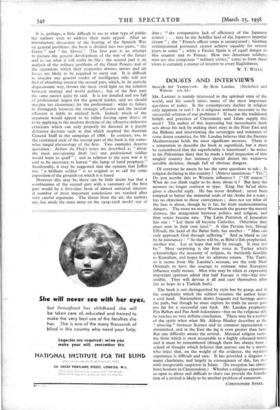DOUBTS AND INTERVIEWS
MR. LANDAU is mainly interested in the spiritual state of the world, and his search raises many of the most important questions of today. Is the contemporary decline in religion only apparent or real ? Is a religious attitude necessary to the successful solution of our problems ? If so, can the traditional beliefs and practices of Christianity and Islam supply this need ? The author of this interesting but inconclusive book sets about his task by making short stays in the Near East and the Balkans and interviewing the sovereigns and ministers of some dozen countries, for Mr. Landau believes that the Eastern Mediterranean holds the most significant answers. There is a temptation to describe the book as superficial, but it must be remembered that the superficiality is intentional : he writes in his Palestinian diary that he made a brief inspection of that tangled country lest intimacy should distort his vision—a sensible decision, though full of obvious dangers.
Of everyone he meets he has the same questions to ask : Is religion declining in this country ? (Almost unanimous " Yes.") Do you ascribe this to Western influence ? (" Of course.") What do you think ought to be done about it ? But • here the answers no longer conform to type. King Ibn Sa'ud alone gives a cheerful reply. He has never doubted ; never been tempted to barter the immortal souls of the Arabs for a tram ; has no objection to those conveyances ; does not see what all the fuss is about, though he is far, far from underestimating dangers. The more we move Westwards the greater the mental distress, the antagonism between politics and religion,- and firm voices become. rare. The Latin Patriarch of Jerusalem has one : " Let them all become Catholics. Otherwise they must stew in their own juice." A slim Persian boy, Shoegi Effendi, the head of the Bahai faith, has another : " Man can only approach God through suffering." And as, bland as can be he announces : " So there will be, as Baha'u'llah prophesied, another war. Let us hope that will be enough. It may not be." Most surprising is the firm voice in Turkey which acknowledges the necessity of religion, its inevitable hostility to Kemalism, and hopes for its ultimate return. The Turks, so it seems from Mr. Landau's account, are the only Near Orientals to have the eourage to estimate what European influence really means. Men who may be taken as expressing important opinions admit that half Europe is vile—but irre- sistible. They will devour it all and cure themselves after (let us hope in a Turkish bath).
The book is not distinguished by style but by grasp, and in the complexity which the subject assumes the author keeps a cool head. Nationalism draws frequent red herrings across the path, but though he must explore its trails he never goes too far for a successful cast back. Mr. Landau prophesies Pan Balkan and Pan Arab federations—but on the religious side he reaches no very definite conclusion. There may be a revival of the spirit when what Mr. Aldous Huxley describes as the " time-lag " between Science and its common appreciation is diminished, and in the East the lag is even greater than here. But one difficulty awaits the revival. Mystical religion seems the form which is most acceptable to a highly educated.mind, and it must be remembered (though there has always been a school of thought which believes that anyone can be a mystic who tries) that, on the weight of the evidence, the mystical experience is difficult and rare. It has provided a disguise to many charlatans, and largely in consequence of this, has met with insuperable suspicion in Islam. (Its reception has always been hesitant in Christendom.) Whether a religious experience so open to abuse and difficult to share can provide the founda- tion of a revival is likely to be another problem of tomorrow.
CHRISTOPHER SYICES.










































































 Previous page
Previous page